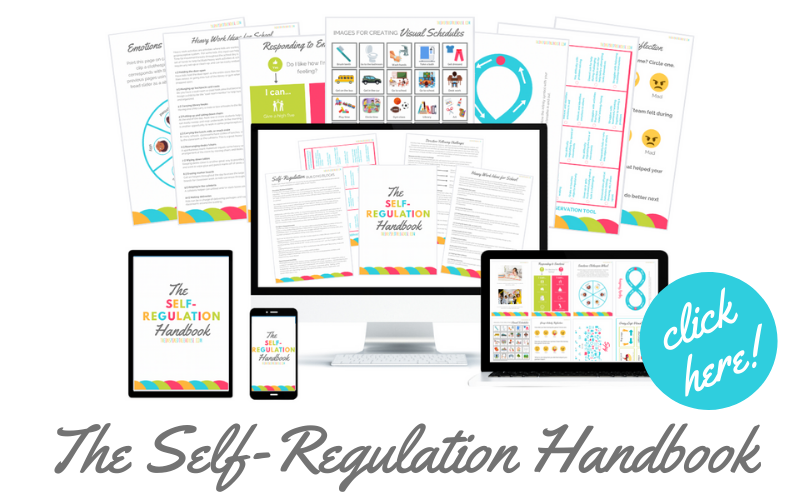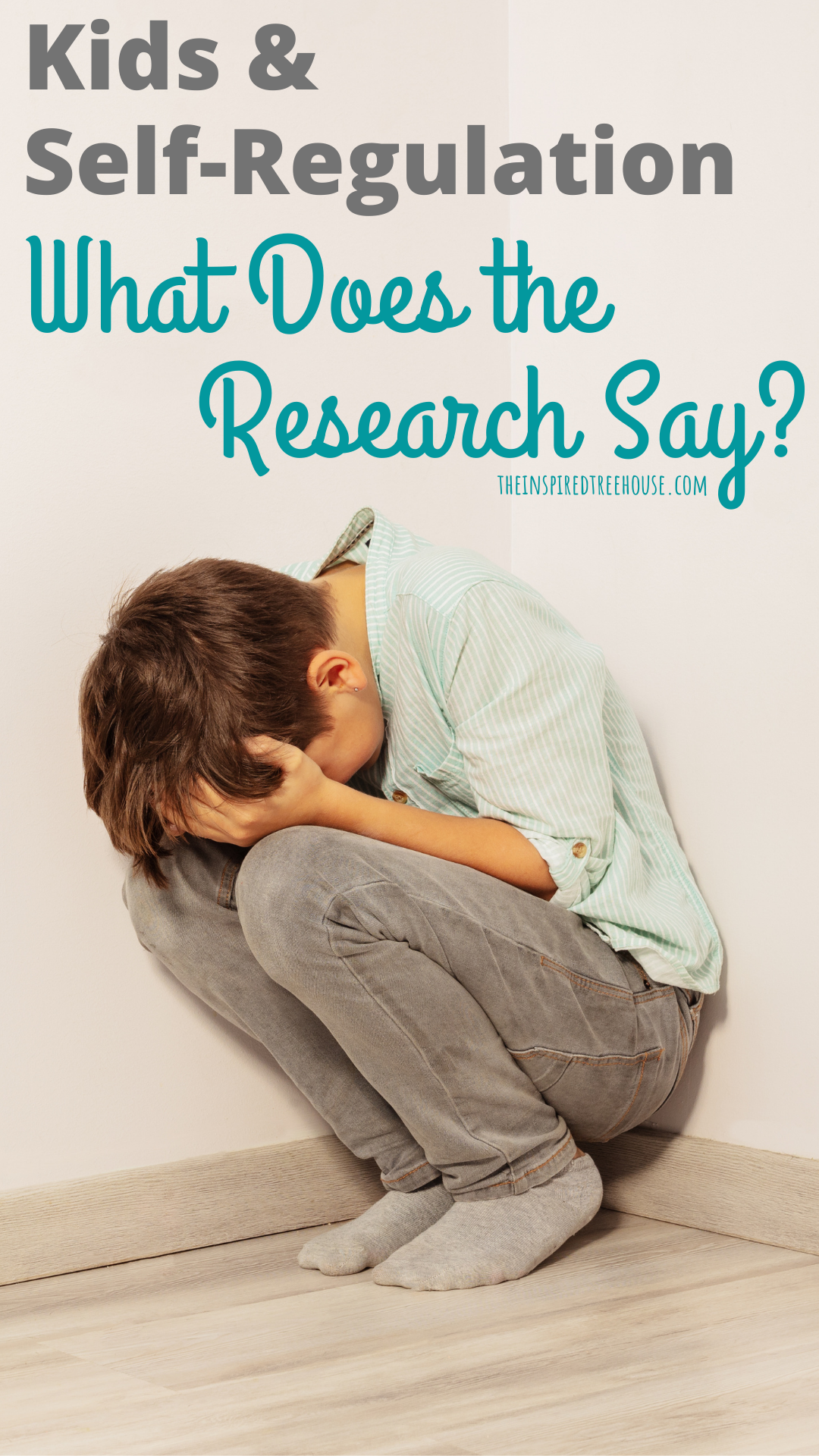Do you work or live with kids who struggle with challenging behaviors? This easy-to-read overview of self-regulation research could help!
If you feel a bit dazed and confused whenever the topic of evidence-based practice (EBP) comes up in conversation…don’t worry. You’re definitely not alone.
The idea that research-based interventions should always be the basis of our therapy practice has been drilled into our heads since day one of being a therapist.
But for as much buzz there is about EBP in the therapy world, there certainly aren’t a lot of resources out there to help us feel confident and supported when it comes to research based practice – especially when it comes to self-regulation research.
We hear from therapists all the time who are frustrated with finding easy, free access to solid research related to relevant topics in pediatric therapy. And, even when they are able to find relevant research, many practicing therapists have a difficult time wading through the statistics and deciphering the research lingo to be able to actually apply the research findings to their work!
That’s why we’re here today – to take a look at some of the self-regulation research and to break it down into terms that everyone can understand so that it can be easily applied in our everyday practice. Let’s get started!
But first, have you checked out our Self-Regulation Handbook yet? It’s the perfect resource for professionals and others who want to support self-regulation in kids. This ebook is packed with tools, games, strategies, and activity ideas that can be used in therapy sessions, in the classroom, or at home to help with emotional regulation and more! Click here to find out more!
Self-Regulation Research
Study #1
This study examines the development of self-regulation between the ages of 3 and 7, with a focus on how the developmental timeline differs within groups of children and how the timeline is impacted by outside factors. The study noted that the majority of children demonstrated rapid gains in behavioral self-regulation between the ages of 3 and 7, emphasizing this as a potential critical period for supports and interventions.
The study also noted that significant gains in self-regulation occur during the preschool years. The authors indicate that programs that focus on self-regulation while also targeting multiple other aspects of development may be impactful for preparing children for the skills they need in school. The article also cites research that found that nearly half of teachers indicated that they feel many children enter kindergarten without the self-regulation skills necessary to be ready to learn in formal education setting.
Study #2
This study was a review and analysis of various types of self-regulation interventions for children and adolescents. The findings indicate that a variety of different types of interventions can be effective in supporting self-regulation, including:
-Curriculum-Based Interventions – Typically implemented in classrooms with the teacher as the main intervention provider. Includes professional training for teachers and classroom-based activities.
-Physical Activity/Exercise-Based Interventions – Using techniques such as martial arts, high intensity interval training, and team games. Typically delivered in school or after-school settings.
-Mindfulness/Yoga Interventions – Typically school based programs with mindfulness or yoga instructors and assistants providing the intervention. These interventions were found to be especially effective for the preadolescent and adolescent age groups
-Family-Based Intervention – Including skill building for parents and children, after-school programs with siblings, mentoring, and parent consultation.
-Other Social & Personal Interventions – Social and personal skills training in small groups using frameworks of personal responsibility, model behavior, conflict resolution, etc.
Findings indicated overall effectiveness of self-regulation interventions in children and adolescents. The study also noted that progress with self-regulation can positively impact educational, health, and social outcomes.
Study #3
This study examined the impact of a set of circle time games on self-regulation. Significant effects were not found for the overall sample, however significant gains in behavioral self-regulation were found for children who entered the study with lower behavioral self-regulation skills. Gains in self-regulation were significantly impacted by the number of intervention sessions that were attended for children with lower initial scores.
Further, in the overall sample of the study, the intervention was found to be significantly related to children’s performance with letter-word identification scores. The games that were used in the intervention focused on attention, working memory, and inhibitory control, and challenged children to follow dynamic multistep instructions. Specific descriptions of the games and activities are included in the article.
Study #4
This practice brief highlights the important role that adults (parents, teachers, coaches, and other mentors) serve in supporting the development of self-regulation for children from birth through young adulthood. The report describes co-regulation as “the interactive process of regulatory support that can occur within the context of caring relationships across the lifespan.” The authors describe co-regulation skills and strategies for caregivers that can be used at various stages of development, including three types of caregiver support: a warm relationship, environmental structure, and skills instruction and coaching.
The practice brief indicates that trainings and interventions aimed at promoting co-regulation can produce impactful changes in parent-child relationships, classroom climate, and the self-regulation of caregivers themselves. The significance of co-regulation strategies and interventions is underscored by the authors by pointing out that strong self-regulation skills correlate with outcomes like: higher income, lower rates of substance use and violence, and decreased long-term health costs.
Self-Regulation Research takeaways
- Rapid gains in behavioral self-regulation occur between the ages of 3 and 7.
- A variety of self-regulation intervention formats can be successful for children and adolescents, including: Curriculum-based, physical activity/exercise-based, mindfulness/yoga, and others.
- Nearly half of teachers in one study indicated that they feel many children enter kindergarten without necessary self-regulation skills.
- Progress with self-regulation can positively impact educational, health, and social outcomes.
- Trainings and interventions aimed at promoting co-regulation can produce impactful changes in parent-child relationships, classroom climate, and the self-regulation of caregivers themselves.
We hope that the findings from these self-regulation studies will support you in your practice as you plan and facilitate interventions for kids. Of course, this short list is just the beginning when it comes to self-regulation research!
There are many other studies on this topic that can help inform you as you work with kids with self-regulation challenges. And if you’re feeling overwhelmed by searching out and applying research to your practice – we’ve got you covered!
Check out some of our other top self-regulation resources below:
-Emotional Regulation Books for Kids
-How to Help Kids With Self-Regulation: 30 Games & Activities [FREE Printable]
-Free Printable Emotional Regulation Activity [FREE Printable]
-Self-Regulation Red Flags [FREE Printable]


Latest posts by Claire Heffron (see all)
- Cute Zipper Bags for Therapists - April 18, 2024
- Fairy Tale Games and Toys - April 12, 2024
- The Best Emotional Regulation Books for Kids - April 8, 2024

